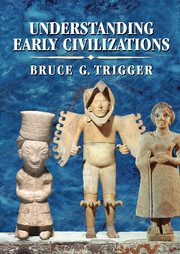Book contents
- Frontmatter
- Contents
- List of Illustrations
- Preface
- Understanding early civilizations
- Introduction
- Sociopolitical organization
- Economy
- 14 Food Production
- 15 Land Ownership
- 16 Trade and Craft Specialization
- 17 Appropriation of Wealth
- 18 Economic Constants and Variables
- Cognitive and symbolic aspects
- Discussion
- References
- Index
15 - Land Ownership
Published online by Cambridge University Press: 05 June 2014
- Frontmatter
- Contents
- List of Illustrations
- Preface
- Understanding early civilizations
- Introduction
- Sociopolitical organization
- Economy
- 14 Food Production
- 15 Land Ownership
- 16 Trade and Craft Specialization
- 17 Appropriation of Wealth
- 18 Economic Constants and Variables
- Cognitive and symbolic aspects
- Discussion
- References
- Index
Summary
In early civilizations surplus crops and, to a lesser extent, livestock were the most abundant sources of wealth, and controlling these resources was the key to political power. The study of the production and control of food surpluses in early civilizations is complicated by vague and conflicting scholarly definitions of key concepts, in particular those relating to land ownership. Some analysts term ‘private’ any land that was not owned by the monarch or the state, whether it was possessed collectively or individually and whether or not it could be sold. Stricter definitions restrict ‘private’ to land owned by individuals that could be sold to any buyer. To reduce these ambiguities, I propose to differentiate three broad categories of land ownership in early civilizations: (1) collective ownership by kinship groups or communities, (2) ownership by institutions such as temples or the state, including landholding by individuals or groups as benefices from such institutions, and (3) private ownership. Because of lack of relevant information, the Classic Maya are excluded from this discussion.
One of the most persistent myths about early civilizations, which can be traced back to Montesquieu, is that of ‘eminent domain’ (Isaac 1993: 432). This is the notion that in early civilizations rulers owned all the land in their kingdoms and prohibited alternative forms of ownership, making everyone the tenant or slave of the ruler. The evidence that has been interpreted as supporting this claim appears to be metaphorical and political in nature.
- Type
- Chapter
- Information
- Understanding Early CivilizationsA Comparative Study, pp. 315 - 337Publisher: Cambridge University PressPrint publication year: 2003



